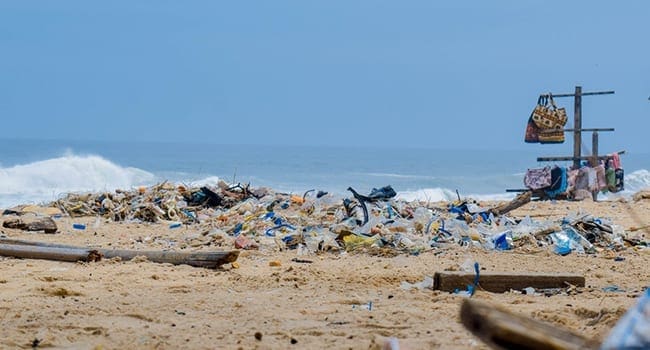 We often see news items about the environmental impact of single-use plastic straws. And we want to do something, which is good.
We often see news items about the environmental impact of single-use plastic straws. And we want to do something, which is good.
Costa Rica plans to ban single-use plastics.
At a recent G7 summit, the nations condemned single use straws and said they will discuss the matter at a future meeting. But no action has yet been taken.
Britain promised to eradicate plastic waste by 2042! Wow, that’s more than two decades from now.
In December, almost 200 nations agreed to limit plastic pollution in the oceans, warning it could outweigh fish by 2030.
Canada has yet to take a position, even though Prime Minister Justin Trudeau promised to lead the charge at the G7 Summit.
These are all good steps. But maybe we don’t need baby steps, we need true affirmative action. What are we waiting for?
What about the hundreds of millions of plastic beverage containers floating in the ocean now?
It’s estimated that a mass of plastic three times the size of Texas is adrift in the Pacific Ocean. We’ve known about this for decades and yet we’ve done nothing to alleviate it. We still make disposable bottles and we still throw them by the wayside.
Machines have been developed to collect and shred the plastics, and bring them back for reuse. Why aren’t we embracing this technology?
It would take a while to overcome the backlog but it could be done.
Single-use plastic ban won’t solve waste problem by Robert Murphy
Instead, we meet and talk about it and really do little to deal with what’s out there. Countless sea animals are dying due to ingestion of plastics. What value do we place on them?
Turtles, seabirds, large fish, porpoises and dolphins and myriad others are being killed annually by plastics. It’s estimated that in Thailand alone, 300 large marine mammals a year are being killed. Extrapolate that around the world’s oceans and the impact is huge.
In fact, one source estimates that over 700 marine species are in danger of extinction primarily due to abandoned plastics. Reportedly, marine plastic pollution has impacted at least 267 species worldwide, including 86 percent of all sea turtle species, 44 percent of all seabird species and 43 percent of all marine mammal species.
And this is just the tip of the iceberg.
Over-packaging continues to be a huge issue. I just attended my granddaughter’s birthday and as dutiful grandparents, we bought her the latest, best-ever doll thingy that she desperately wanted. I helped her unpack it and found more than 100 pieces of single-use plastic of various calibers and weights. Couldn’t they have put all the bits and pieces into a paper sack inside the main toy and maybe have one or two tie-downs so it wouldn’t flop around?
I bought a three-receiver cordless phone from Panasonic recently. Packaged inside the over-sized outer box were four smaller cardboard boxes, 12 plastic bags and four plastic twist ties. Why?
The growing ban on plastic straws comes as United Nations figures show eight million tonnes of plastic (e.g. bottles, packaging and other waste) enter the ocean each year, killing marine life and entering the human food chain.
Clean Water Action reports that “Seabirds that feed on the ocean surface are especially prone to ingesting plastic debris that floats. Adults feed these items to their chicks, resulting in detrimental effects on chick growth and survival. One study found that approximately 98 percent of chicks sampled contained plastic and the quantity of plastic being ingested was increasing over time.” They also report that 35 percent of fish caught in one study had ingested some plastic.
Researchers at the Algalita marine research foundation reported “an increase in plastic debris in the Central Pacific five-fold between 1997 and 2007.” The baseline (1997) showed plastic pieces outnumbered plankton on the ocean surface by six to one. Off Japan’s coast, the quantity of pelagic plastic particles floating increased 10-fold in 10 years between the 1970s and 1980s, and then again 10-fold every two to three years in the 1990s and beyond.
A story recently published by care2.com reported that would-be rescuers found that a beached pilot whale in Thailand had eaten more than 17 pounds of plastic, including 85 plastic bags. It’s believed the whale mistook the bags for food, possibly thinking they were jellyfish.
In another incident in 2010, a California grey whale washed up dead on the shores of Puget Sound. Its stomach contained a pair of pants, a golf ball, more than 20 plastic bags, small towels, duct tape and surgical gloves.
Okay, so there’s plenty of evidence. But what should we do?
At a grassroots level, restaurant patrons are demanding throughout Europe and North America that plastic straws be banned. Some jurisdictions have actually passed legislation to this effect. A few municipalities have banned plastic juice and water bottles at municipal facilities.
People respond to the imminent and get excited when something weird and shocking is brought to their attention, It appears that much of the hoopla about plastic straws arose after a YouTube video was posted showing a straw stuck in the nostril of a sea turtle.
So suddenly we care about straws, but the micro-plastics and other ‘invisible’ waste (i.e. the Texas-sized drifting mass of plastic in the pacific) goes unattended.
Locally, we can encourage our grocery outlets to have plastics-free aisle in their stores.
We can fill out those survey forms we get on our restaurant receipts and tell them we don’t like milk, cream, ketchup or butter served in tiny, wasteful plastic single-serving containers. We can protest if they use plastic instead of biodegradable straws.
We can think about what we flush down the toilet. Don’t ever flush anything with plastic in it, including cotton swabs and the like.
We can tell manufacturers to stop unnecessary over-packaging.
Best of all, we can encourage our federal and provincial governments to actually do something affirmative and stop just talking about it!
Geoff Carpentier is a published author, expedition guide and environmental consultant. Visit Geoff on-line at www.avocetnatureservices.com and on LinkedIn and Facebook.
The views, opinions and positions expressed by columnists and contributors are the author’s alone. They do not inherently or expressly reflect the views, opinions and/or positions of our publication.


